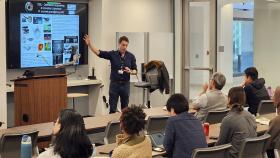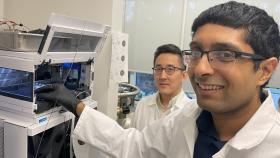Manu Platt has been named the new associate chair for graduate studies in the Wallace H. Coulter Department of Biomedical Engineering.
Platt officially takes on his new responsibilities July 1, though he already has been working with current associate chair Michael Davis on a seamless transition.
“I am thrilled that is Manu taking on this new role in the Department. He has proven to be a talented and enthusiastic advocate for our programs, and I look forward to tapping his creativity and leadership in a new way,” said Susan Margulies, Wallace H. Coulter Chair of the Department. “I’m also deeply grateful to Mike Davis for his guidance and dedication over the last five years. He has been a tireless champion for our students and graduate programs.”
Platt said he will build on a long tradition of success that includes a true commitment to diversity and inclusion, engaging and empowering students to chart their own unique path, and preparing graduates for success across a variety of careers.
“As an alumnus of this Ph.D. program, I take great pride in this program,” Platt said. “I truly believe that we have the best program in the country, and I am grateful for the opportunity to build on our many strengths and long tradition of success.”
Platt has led the Department’s graduate admissions and recruiting efforts for the last four years, helping establish Coulter BME as a leader in attracting and retaining students from historically underrepresented backgrounds. He also serves as deputy director of the interdisciplinary bioengineering graduate program at Georgia Tech.
Platt said his priorities as associate chair will include adding greater structure to the student-advisor matching process, creating more opportunities for new students to meet and interact with faculty members, and improving mental health training to help students distinguish between transient issues and more severe problems. He said he would like to use thesis and dissertation committees to foster new connections and collaborations among faculty members. And he plans to offer more professional development and career planning guidance for students.
“While an academic career is rewarding and exciting, the truth is that a number of our graduates will not pursue this pathway. Preparation for success in all career paths empowers students to choose their own adventures — whether industry, government, nonprofit, entrepreneurship, and more. This is a critical component of developing the whole biomedical engineer that we must retain and strengthen,” he said.
Platt has been a member of the Coulter BME faculty for more than a decade. His research focuses on understanding how cells sense, respond to, and remodel their immediate mechanical and biochemical environments for tissue repair and regeneration. He also leads two programs aimed at improving access and inclusion for underrepresented groups in science, technology, engineering, and math. Project ENGAGES focuses on students at several high schools in Atlanta; GT-ESTEEMED is a National Institutes of Health-funded program for undergraduates.
Media Contact
Communications
Wallace H. Coulter Department of Biomedical Engineering
Latest BME News
The 2007 BME alum will lead efforts to bring medical technologies to market.
BME graduate leveraging Coulter experience to bridge continents and inspire students
Seven other Faculty Members from Coulter Department Named to Fall 2024 Honor Roll
Researcher Michaël Girard delivers eye-popping presentation at BME Seminar Series
Anant Madabhushi part of Emory team awarded up to $17.6 million to innovate surgery, improve outcomes
BME researchers combine precision and simplicity in transforming diagnostic tools.
Researchers demonstrate stem cell treatment without chemotherapy and painful bone marrow procedure
BME researchers explore the critical role of mechanical force in rare genetic disorder







